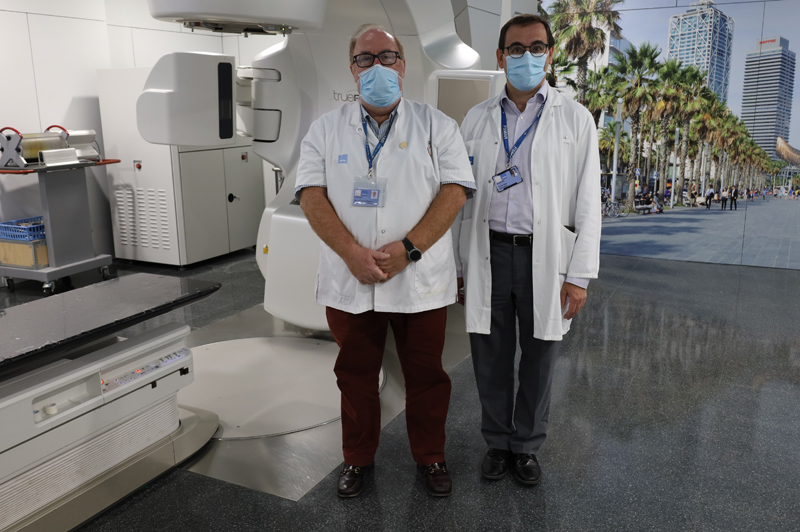
19/10/2022 - Press release
A multicentre study involving hospitals in Spain and Portugal, led by Hospital del Mar, shows that these patients already receive enough radiation to treat the disease when the breast affected by the tumour is irradiated directly. The study monitored more than 400 women. The results indicate that the five-year survival rate and relapses are practically identical between those who underwent specific treatment targeting the nodes located in the armpits and those who only received breast radiation. The findings of the OPTIMAL study have been published in the journal Radiation Oncology and can now be applied to clinical practice. Thanks to this fact, patients will need less radiotherapy and will suffer fewer treatment-related side effects.
Women with breast cancer who undergo breast-conserving surgery and who have a low tumour burden in the lymph nodes, i.e., less than three nodes affected, do not need an additional dose of radiotherapy to treat the tumour. This is the conclusion of a study published in the leading journal in the field, Radiation Oncology, which involved hospitals in Spain and Portugal and was led by the Radiation Oncology Department at Hospital del Mar.
The most important aspect of the study is that its conclusions are immediately applicable, as they ratify the recommendations that are beginning to appear in clinical practice guidelines. "The results obtained corroborate the expert opinion already reflected in clinical practice guidelines", says Dr. Manel Algara, first author of the study, head of the Radiation Oncology Department and coordinator of the Radiation Oncology Research Group at the Hospital del Mar Medical Research Institute. This means that women suffering from breast cancer who have a low tumour load in their lymph nodes will receive less radiotherapy. "These are patients with very little tumour load in their armpits, who do not need radiation on all their lymph nodes, only the lower part of the armpit", explains Dr. Algara. It is estimated that this includes between 6 and 12% of women affected by breast cancer who are treated with breast conserving surgery.

El Dr. Manel Algara i el Dr. Xavier Sanz
Less radiotherapy: fewer side effects
The OPTIMAL study (OPTimizing Irradiation through Molecular Assessment or Lymph node) monitored 427 patients with this pathology over a five-year period, involving around twenty hospitals in Spain and Portugal. Some received breast-targeted radiotherapy after surgery, followed by five weeks of lymph node treatment. In the remainder, only the affected breast was irradiated, with the same dose applied to the whole breast. This means that the radiation only reached the lower part of the axillary zone.
The researchers were able to demonstrate that the relapse rates and the five-year survival rates of over 93% were almost the same in the two groups, showing that not directly irradiating the lymph nodes in this group of women is both safe and advisable. "For patients, this means less radiotherapy, which means fewer treatment side effects", says Dr. Algara.
Reference article
Algara López M, Rodríguez García E, Beato Tortajada I, Martínez Arcelus FJ, Salinas Ramos J, Rodríguez Garrido JR, Sanz Latiesas X, Soler Rodríguez A, Juan Rijo G, Flaquer García A. OPTimizing Irradiation through Molecular Assessment of Lymph node (OPTIMAL): a randomized open label trial. Radiat Oncol. 2020 Oct 2;15(1):229. doi: 10.1186/s13014-020-01672-7. PMID: 33008422; PMCID: PMC7531133.
Further information
© Institut Hospital del Mar
d'Investigacions MèdiquesLegal Notice and Privacy Policy | Cookie Policy | Site Index | Accessibility | Find Us | Contact